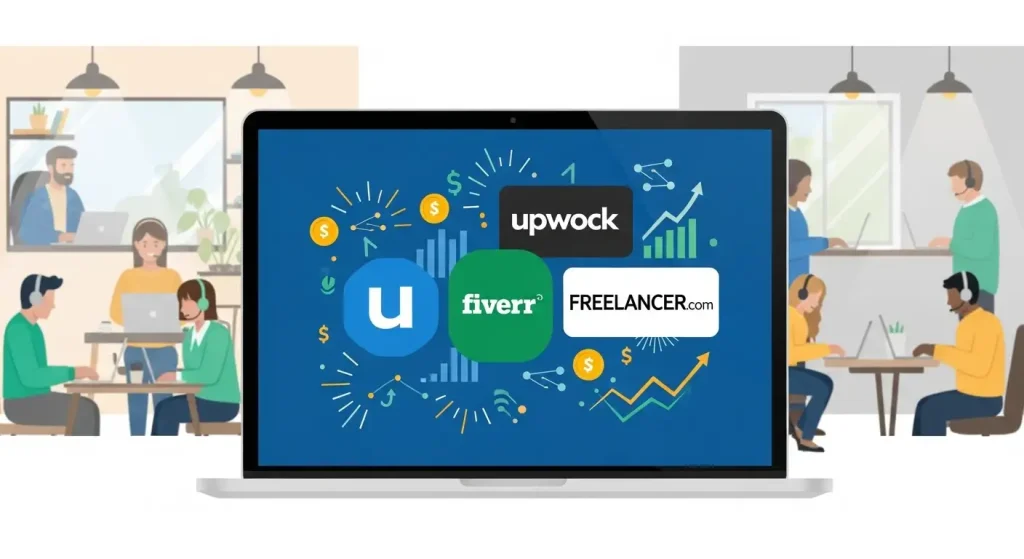The freelance economy is booming, with over 73 million Americans freelancing in 2025 and contributing $1.35 trillion to the economy annually. For beginners looking to enter this lucrative market, understanding the landscape of freelancing platforms is crucial for success.
Whether you’re a writer, designer, developer, or have any marketable skill, the right freelancing platform can be your gateway to financial freedom and flexible work arrangements. This comprehensive guide will walk you through the top freelancing platforms and help you choose the perfect one to start your freelance journey.
Optimize Your LinkedIn Profile for Job Search Success: Complete 2026 Guide
What Are Freelancing Platforms?
Freelancing platforms are online marketplaces that connect freelancers with clients seeking specific services. These digital platforms serve as intermediaries, providing tools for project management, secure payments, communication, and dispute resolution.
These platforms remain top choices for professionals across industries, from beginners to those with many years of experience, thanks to their secure payment systems, talent-matching tools, and global reach.
Key Benefits of Using Freelancing Platforms:
- Global client access – Connect with clients worldwide
- Secure payment systems – Protected transactions and guaranteed payments
- Built-in tools – Project management, time tracking, and communication features
- Portfolio building – Showcase your work and build credibility
- Rating systems – Build reputation through client feedback
Best Healthy Snacks to Keep You Energized All Day
Top 5 Freelancing Platforms for Beginners
1. Fiverr – Best for Quick Service-Based Gigs
Best for: Creative services, digital marketing, writing, design Commission: 20% on each transaction Difficulty: Beginner-friendly
For beginners, Fiverr can be an excellent starting point because its “gig” model allows you to create a service offering without having to bid on projects. On Fiverr, you create service packages called “gigs” with fixed prices, and clients come to you.
Fiverr Advantages:
- No bidding required – clients find you
- Fixed-price model prevents scope creep
- Easy to set up and start selling
- Great for building initial portfolio
- Strong brand recognition globally
Getting Started on Fiverr:
- Create compelling gig titles with relevant keywords
- Write detailed gig descriptions explaining your services
- Set competitive pricing (start low, increase as you gain reviews)
- Upload portfolio samples and videos
- Optimize gigs for Fiverr’s search algorithm
2. Upwork – Best Overall Freelancing Platform
Best for: All skill levels and industries Commission: 10% for first $500 with each client, then decreases Difficulty: Moderate learning curve
Upwork is also a solid choice due to the sheer volume of jobs available, including many entry-level opportunities. As the world’s largest freelancing platform, Upwork offers the most diverse range of projects and clients.
Upwork Advantages:
- Largest job marketplace with millions of projects
- Hourly and fixed-price project options
- Advanced screening tools for quality clients
- Built-in time tracking and invoicing
- Long-term client relationship potential
Upwork Success Tips:
- Create a detailed profile highlighting your expertise
- Take relevant skill tests to boost credibility
- Write personalized proposals for each job
- Start with smaller projects to build your reputation
- Maintain high job success scores
How to Build an Emergency Fund Quickly: 8 Proven Strategies
3. Freelancer.com – Most Competitive Platform
Best for: Budget-conscious beginners willing to compete Commission: 10% or monthly membership fees Difficulty: High competition
In 2025, Upwork has several competitors in the freelancing platform space, including Fiverr, Wishup, Freelancer.com, and Guru.com. Freelancer.com operates on a bidding system where multiple freelancers compete for projects.
Freelancer.com Features:
- Contest-based projects available
- Milestone payment system
- Mobile app for on-the-go management
- Skills certification programs
- Local job opportunities
4. Guru – Professional-Focused Platform
Best for: Experienced professionals seeking quality clients Commission: 5-9% based on membership level Difficulty: Moderate to advanced
Guru attracts more established businesses and offers a professional environment with lower commission rates for premium members.
Guru Benefits:
- Lower fees than major competitors
- Work room collaboration tools
- Flexible payment options
- Professional client base
- Industry-specific job categories
5. PeoplePerHour – UK-Focused Platform
Best for: European market access, hourly work Commission: 3.5-20% sliding scale Difficulty: Beginner to intermediate
PeoplePerHour combines fixed-price “hourlies” with traditional project bidding, making it ideal for both quick services and complex projects.
Top 5 Budgeting Apps to Manage Your Money in 2026
Choosing the Right Freelancing Platform for You
Consider Your Skill Level
Complete Beginners:
- Start with Fiverr for its gig-based model
- Consider Guru for lower competition
- Use PeoplePerHour for quick wins
Some Experience:
- Try Upwork for maximum opportunities
- Explore Freelancer.com for competitive pricing
- Test multiple platforms simultaneously
Evaluate Your Service Type
Creative Services (Design, Writing, Video):
- Fiverr excels in creative categories
- 99designs for design-specific work
- Upwork for long-term creative projects
Technical Skills (Programming, Development):
- Upwork offers the most technical projects
- Toptal for high-end development work
- Freelancer.com for budget-friendly coding gigs
Marketing and Business Services:
- Upwork dominates in business consulting
- Fiverr for quick marketing tasks
- Guru for professional marketing projects
How to Build a Professional Portfolio: Complete Career Advice Guide
Essential Tips for Freelancing Platform Success
1. Create a Compelling Profile
Your profile is your digital storefront. Include:
- Professional headshot
- Clear, benefit-focused headline
- Detailed description of your services
- Portfolio samples
- Relevant skills and certifications
2. Price Strategically
Beginners should look for fair fee structures with reasonable commission rates that don’t eat into earnings excessively.
Pricing Strategies:
- Start 10-20% below market rate to build reviews
- Gradually increase prices as you gain experience
- Offer package deals for better value perception
- Research competitor pricing regularly
3. Write Winning Proposals
- Address the client’s specific needs
- Demonstrate understanding of their project
- Include relevant work samples
- Propose a clear timeline and deliverables
- End with a compelling call-to-action
4. Deliver Exceptional Work
- Communicate proactively with clients
- Meet all deadlines consistently
- Exceed expectations when possible
- Ask for feedback and reviews
- Handle revisions professionally
Fitness Routines at Home Without Gym: Complete Guide to Bodyweight Workouts
Common Freelancing Platform Mistakes to Avoid
- Spreading too thin across platforms – Focus on 1-2 initially
- Underpricing services – Know your worth and value your time
- Ignoring platform algorithms – Optimize for search visibility
- Poor communication – Respond quickly and professionally
- Not building relationships – Focus on long-term client connections
- Neglecting portfolio updates – Keep showcasing your best work
Building Your Freelancing Platform Strategy
Month 1: Foundation Building
- Choose 1-2 primary platforms
- Create optimized profiles
- Upload portfolio samples
- Apply to 5-10 entry-level projects
- Focus on getting first reviews
Month 2-3: Skill Development
- Complete small projects successfully
- Request client testimonials
- Refine service offerings
- Increase project complexity
- Start building repeat client relationships
Month 4-6: Scaling Up
- Raise rates gradually
- Expand to additional platforms
- Develop specialized niches
- Create premium service packages
- Build a pipeline of regular clients
Complete Guide to Holistic Self-Care Practices
Frequently Asked Questions
Which freelancing platform is best for absolute beginners?
Fiverr is generally considered the best freelancing platform for absolute beginners because of its gig-based model. You can create service offerings without having to bid on projects, making it easier to start earning immediately. The platform allows you to set your own prices and wait for clients to come to you, which removes the competitive bidding element that can be intimidating for newcomers.
How much can I realistically earn on freelancing platforms as a beginner?
Beginner earnings on freelancing platforms vary widely based on skills, dedication, and platform choice. Most beginners start earning $5-25 per hour, with potential to reach $50-100+ per hour as they gain experience and build their reputation. Platforms like Toptal typically offer the highest-paying gigs, while Fiverr and Upwork provide good earning potential for various skill sets. Success depends on consistently delivering quality work and gradually building your client base.
Should I use multiple freelancing platforms or focus on just one?
For beginners, it’s recommended to start with one primary platform to build a strong foundation before expanding. Rather than spreading yourself thin across dozens of platforms, focus on one or two that match your skills to receive higher-quality opportunities and save valuable time. Once you’ve established yourself and built a good reputation on one platform, you can gradually expand to others to diversify your income sources.
What are the typical commission rates on major freelancing platforms?
Commission rates vary significantly across freelancing platforms. Fiverr charges 20% on all transactions, while Upwork uses a sliding scale starting at 20% for the first $500 with each client, then decreasing to 10% and eventually 5%. These platforms take up to 20% commission on your hard-earned money, plus additional transaction fees. Guru offers lower rates of 5-9% based on membership level, making it attractive for higher-volume freelancers.
Wearable Health Trackers for Daily Wellness
Start Your Freelancing Journey Today
The world of freelancing platforms offers incredible opportunities for anyone willing to put in the effort to learn and grow. Whether you choose Fiverr’s beginner-friendly gig model or Upwork’s comprehensive marketplace, success comes from consistent effort, quality work, and building strong client relationships.
Remember that every successful freelancer started as a beginner. The key is to start, learn from each project, and continuously improve your services and platform strategy.










